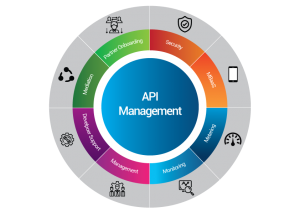 API management is the process of overseeing Application Programming Interfaces(API’s) in a secure, scalable environment. The goal of API management is to allow organizations that either publish or utilize an API to monitor the interface’s lifecycle and ensure the needs of developers and applications using the API are being met.API management needs may differ from organization to organization, but API management itself encompasses some basic functions, including security, monitoring, and version control.
API management is the process of overseeing Application Programming Interfaces(API’s) in a secure, scalable environment. The goal of API management is to allow organizations that either publish or utilize an API to monitor the interface’s lifecycle and ensure the needs of developers and applications using the API are being met.API management needs may differ from organization to organization, but API management itself encompasses some basic functions, including security, monitoring, and version control.
API management has become increasingly important due to business’s growing dependency on APIs, a significant rise in the number of APIs they depend on and the administrative complexities APIs introduce. The requirements and process of building and managing APIs are different than most other applications. In order to be utilized properly, APIs require strong documentation, increased levels of security, comprehensive testing,routine versioning, and high reliability. Because these requirements often go beyond the scope of the software-based projects organizations typically run, the use of API management software has become popular.
An API management platform acts as a proxy for API requests and protects the back ends of services from being brought down from too many queries or breaches. Those in the organization considered to be an API manager may use API management platforms to ensure customers, partners or internal users don’t take down services intentionally or unintentionally by making too many queries to the back-end server. Generally, API management platforms also include analytics and usage reporting, API key and authorization management, live updated documentation and developer community management.